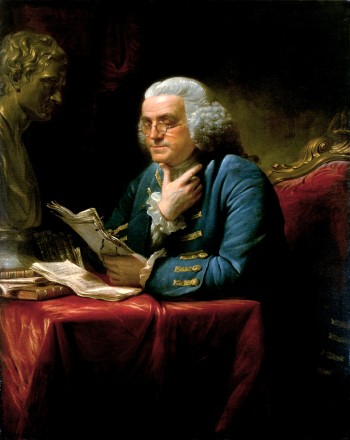“Boston, April 3, 1775.
Sir, – Altho’ I have not the pleasure either of a personal or epistolary acquaintance with you, I have taken the liberty of sending you by Mr. Dana a pamphlet which I wish was more deserving of your notice. The ability and firmness with which you have defended the Rights of mankind and the Liberties of this Country in particular have rendered you dear to all America. May you soon see your enemies deprived of the power of injuring you, and your friends in a situation to discover the grateful sense they have of your exertions in the cause of freedom.
I am, Sir, with the greatest esteem and respect,
Your most humble servant,
Joseph Warren
[To:] Doctor Franklin
Doctor Benjamin Franklin, London.
Pr. Favr. Mr. Dana”
Source: Richard Frothingham, The Life and Times of Joseph Warren, Boston: Little, Brown & Co., 1865, pp. 448-449. Also published in Proceedings of the Massachusetts Historical Society, 1863: Vol. 7, page 125. This letter was donated by the Society of the Cincinnati to the Massachusetts Historical Society. It was said to have been found during the 19th century in a secret compartment of a bureau used by Franklin while he was in London.
Discussion: The enclosed pamphlet from Warren to Franklin is not identified. A reasonable guess would be that Warren had enclosed a published pamphlet of his March 1775 Boston Massacre Oration. I infer that he was quite proud of the “toga speech.” Sharing it provided a pretext for personally introducing himself to the famous Franklin. Such niceties were not really necessary as Warren was at this time president pro tem of the Massachusetts Provincial Congress, Boston was on point relative to differences with England, and Franklin was the colonial agent in London struggling to make common cause with British Whigs for averting an outbreak of hostilities.
Had Warren lived, one could imagine the authoritative and jocular elder statesmen, scientist, leading Mason, and alleged ladies’ man getting along famously with the Massachusetts politician who was half his age, but shared some common attributes. Warren’s early success as a physician was during the epidemic of smallpox in Boston back in 1764 in which he probably adapted the inoculation method published by Franklin and Heberden in 1759.

 Follow
Follow